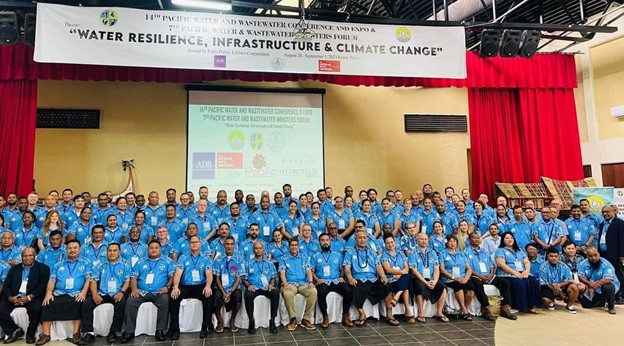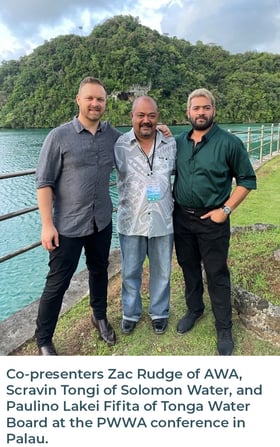Partnerships that work: Australian and Pacific water utilities find common ground building climate resilience

Last week, key stakeholders from the Pacific water sector gathered for the Pacific Water and Wastewater Association (PWWA) Annual Conference & 7th Ministerial Meeting of Water Ministers in Palau, under the theme of ‘Water Resilience, Infrastructure, and Climate Change’.
The Australian Water Association (AWA), supported by Australian Department of Foreign Affairs and Trade via the Australian Water Partnership joined the program to co-present with Solomon Water and Tonga Water Board, on the theme of ‘partnerships that work’. The article below is an abridged version of this presentation, presented by Scravin Tongi of Solomon Water, Paulino Lakei Fifita of Tonga Water Board, and Zac Rudge of AWA.
A need for collective action
To mitigate the impacts of climate change on water resources, infrastructure, and vulnerable communities in the Asia-Pacific region, there is an urgent need for collective action. By uniting efforts, through transformative partnerships between key stakeholders we can accelerate progress towards climate resilience, adaptive water management, and sustainable development.
Partnering for collective impact
AWA is partnering for collective impact with peak water associations and their members in Vietnam, Indonesia, Solomon Islands, and Tonga to achieve Sustainable Development Goals in clean water and sanitation, gender equity, and climate action, through the ‘Partnerships for a Resilient and Climate Smart Water Sector’ Program.
As part of this Program, AWA is partnering with the Pacific Water and Wastewater Association (PWWA) to support localised projects with Tonga Water Board and Solomon Water, who are ‘twinned’ with two Australian utilities: Unitywater, from Queensland, and Goulburn Valley Water, from Victoria.
Supporting strategic organisational goals
 These partnerships are locally led, prioritising equitable decision-making, capacity building, and knowledge exchange. They aspire to be transformational, supporting strategic organisational goals by:
These partnerships are locally led, prioritising equitable decision-making, capacity building, and knowledge exchange. They aspire to be transformational, supporting strategic organisational goals by:
- Building local leadership – centering local decision making in the partnerships, with support from international partners from Goulburn Valley Water and Unitywater
- Providing opportunities to try different approaches – the partnerships provide a safe setting for innovation, creativity, and to take informed risks
- Improving core and critical business capacities – the business is to provide safe water 24/7, but the job never changes. It is how utilities do the job that can change for the better
- Increasing collective impact – climate change is a global issue, and it needs a united, global response
“By building strong international partnerships, we are extending our disaster resilience and response teams beyond our national sovereignty. With more, and stronger networks, utilities are better able to mobilise resources when necessary, and we are better able to look after our global family”. - Scravin Tongi of Solomon Water
Through these partnerships, we are more able to create change across the region on the big issues of climate change and access to clean water.
The Partnerships
Solomon Water and Goulburn Valley Water Twinning Partnership: From Spring to Cash
Through the partnership, Solomon Water and Goulburn Valley Water have created project teams to work on each of the following action areas:
- Finding solutions for rising sea levels: reducing saltwater ingress at Noro water source on New Georgia Island
- Reducing non-revenue water (NRW) in Honiara with a pilot in three district metered areas (DMAs)
- Strengthening the meter to cash process – mapping and identifying areas for development in the process, focusing on the same DMAs piloted in the NRW project
Unitywater and Tonga Water Board Partnership: Managing Assets, Disaster Response, and Operator Capacities
Through the partnership, Tonga Water Board and Unitywater have created collaborative project teams on the following key action areas:
- Strengthening the asset management framework for TWB's new solar farm
- Increasing cyclone disaster preparedness and response capacities
- Operator capacity - building baseline operator knowledge and skills
What makes partnerships work?
Based on Tonga Water Board and Solomon Water experiences with Unitywater and Goulburn Valley Water, here are some reasons why these partnerships are working:
- A commitment to work through the challenges on both sides
- Openness, honesty, and time – truly knowing the realities of each organisation
- Deep commitment to listening – understanding issues from local perspectives and finding common ground
- Creativity and a willingness to take risks – being willing to fail together to learn and build trust together
- Making accommodations – It is important to meet the needs of both partners by being flexible to daily operational needs
“With these partnerships we are building long term relationships and capacity, not just doing projects. Let’s keep this partnership work an ongoing priority in the years to come.” – Paulino Lakei Fifita of Tonga Water Board.
The challenge
These partnerships are proving strong, and successful, but they are young. Achieving impact in one, two, or three years is challenging – we must think of longer timelines. What can we do now that will sustain impact in 40, 50, or 100 years time?
It takes time and investment to build respectful, impactful partnerships, where all partners can contribute fully. Together with PWWA, we are committed to strengthening the relationships that we have built, and to supporting the development of new transformative partnerships that can meet the challenges we all face from a changing climate.

